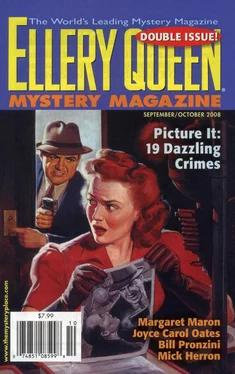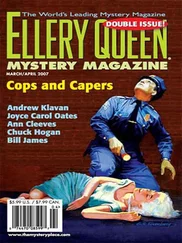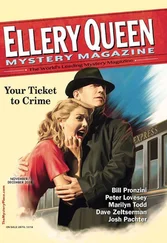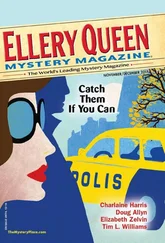Robert Barnard - Ellery Queen's Mystery Magazine. Vol. 133, No. 3 & 4. Whole No. 805 & 806, September/October 2008
Здесь есть возможность читать онлайн «Robert Barnard - Ellery Queen's Mystery Magazine. Vol. 133, No. 3 & 4. Whole No. 805 & 806, September/October 2008» весь текст электронной книги совершенно бесплатно (целиком полную версию без сокращений). В некоторых случаях можно слушать аудио, скачать через торрент в формате fb2 и присутствует краткое содержание. Город: New York, Год выпуска: 2008, ISBN: 2008, Издательство: Dell Magazines, Жанр: Детектив, на английском языке. Описание произведения, (предисловие) а так же отзывы посетителей доступны на портале библиотеки ЛибКат.
- Название:Ellery Queen's Mystery Magazine. Vol. 133, No. 3 & 4. Whole No. 805 & 806, September/October 2008
- Автор:
- Издательство:Dell Magazines
- Жанр:
- Год:2008
- Город:New York
- ISBN:ISSN 0013-6328
- Рейтинг книги:4 / 5. Голосов: 1
-
Избранное:Добавить в избранное
- Отзывы:
-
Ваша оценка:
- 80
- 1
- 2
- 3
- 4
- 5
Ellery Queen's Mystery Magazine. Vol. 133, No. 3 & 4. Whole No. 805 & 806, September/October 2008: краткое содержание, описание и аннотация
Предлагаем к чтению аннотацию, описание, краткое содержание или предисловие (зависит от того, что написал сам автор книги «Ellery Queen's Mystery Magazine. Vol. 133, No. 3 & 4. Whole No. 805 & 806, September/October 2008»). Если вы не нашли необходимую информацию о книге — напишите в комментариях, мы постараемся отыскать её.
Ellery Queen's Mystery Magazine. Vol. 133, No. 3 & 4. Whole No. 805 & 806, September/October 2008 — читать онлайн бесплатно полную книгу (весь текст) целиком
Ниже представлен текст книги, разбитый по страницам. Система сохранения места последней прочитанной страницы, позволяет с удобством читать онлайн бесплатно книгу «Ellery Queen's Mystery Magazine. Vol. 133, No. 3 & 4. Whole No. 805 & 806, September/October 2008», без необходимости каждый раз заново искать на чём Вы остановились. Поставьте закладку, и сможете в любой момент перейти на страницу, на которой закончили чтение.
Интервал:
Закладка:
He uncovered a shock of red hair and hopped up onto the orange leather chair. “My mother’s dead. I live with my aunt. She don’t know I’m here. She says if my father was worth looking for he wouldn’t have to be looked for.”
“She has a point, though the syntax is dubious logically. Why do you want to find him?”
“Aunt Jill’s okay, but I’m sick of living with girls. My father left before I was born. I’m not sure my mother even knew his name.” He lifted his chin.
“That’s unfortunate. Without a name or a description, there’s no place to start.”
“He’s a tall, skinny redhead and his name’s William Thew.”
I was taking notes, poised as ordered to throw myself into the bacterial breach if necessary. “That’s T-H-E-W?”
“I don’t know. He didn’t spell it out.”
Lyon said, “You stated he left before you were born. When did you meet?”
“The day my mother died, in Brooklyn General Hospital.”
Kids are natural reporters; it’s only when they grow up that they learn to digress and embellish. His mother had been hit by a truck in a crosswalk near their apartment six months ago and died a few days later without regaining consciousness. That day, Jasper and his aunt got off the hospital elevator just as the man he’d described was leaving his mother’s room. The man, who was about thirty, was wearing a heavy overcoat over faded jeans and was obviously not a hospital employee. Asked if he’d come to visit the patient, he’d said yes. When the aunt asked who he was, he’d hesitated, turned toward a window in the corridor, then turned back and said, “William Thew.”
“How do you know my sister?”
“We, uh, went to school together.”
“Is she awake?”
“No.”
“It was very kind of you to come. Where can I contact you in case her condition changes?”
He gave her a phone number, then looked at his watch and said he had to get back to work. The elevator was open, and as he stepped inside, Jasper spoke up. “What kind of work?”
“I’m an artist.” The doors slid shut and he descended.
“Did you have any contact after that?” Lyon asked.
“No. After Mom died, Aunt Jill tried the number, but it was phony. We looked for him at the funeral. He didn’t show.”
“How did he know your mother was in the hospital?”
“The accident was in the paper. He must’ve read about it.”
“Did either of you ask at the nurses’ station if he’d stopped there to find out what room she was in?”
“My aunt did, but you know what those places are like, nurses coming and going all the time. Nobody remembered him.”
“What makes you think he’s your father?”
“Well, we both have red hair.”
“Ten percent of the population does.”
“I just know, okay?”
“Not okay. Mr. Woodbine informed you I’m not a fortuneteller, and I don’t believe you are one either.”
“Aunt Jill thinks I’m nuts, too. Gimme a pencil and a piece of paper.”
Lyon looked at me. I got a sheet of stationery out of my desk and a Cross pen and gave them to the kid. He folded the paper into a stiff square, stuck his tongue out the corner of his mouth, and scribbled, stopping a couple of times to look up at Lyon. He handed back the sheet, blank side up. I passed it to Lyon, who glanced at it and gave it back to me. I grinned. In a few strokes the kid had captured his basketball-shaped head and that sourpuss expression he wears when he thinks he’s being poker-faced. Jasper Hull had a future as a cartoonist.
“He said he’s an artist,” Jasper said. “My mother couldn’t draw a straight line and neither can my aunt. Where’d I get it if not from him?”
“Young man, Shakespeare’s father was once fined for maintaining a dungheap in his front yard. His son wrote Hamlet . Gus!”
The kid jumped, but I was used to that bellow. The major-domo in the rusty cutaway coat hobbled in with a cream soda and left as Lyon pried off the cap, swigged, and burped. Then he started digging in his ear with a finger. That caught me off guard. I hadn’t thought the conversation had provided anything to bother waking up his cortex over.
He withdrew the finger. “Do you remember the number of your mother’s room at Brooklyn General?”
“Six-oh-eight, why?”
“You came here seeking the services of a detective, not lessons in the practice of the craft. Please leave a number where you can be reached with Mr. Woodbine.”
“Yeah, I bet he calls.”
I showed him out and went back to the office, where Lyon was studying the sketch. “The tough little nut stole my pen,” I said, “but that’s all right. He sure can draw.”
“Caricature is the lowest form of humor. Dispose of it.”
I put it in my breast pocket. I hoped I could find a frame the right size.
“I want you to take the digital camera and photograph the view from all the windows between room six-oh-eight and the elevator in Brooklyn General,” he said. “Shoot every angle.”
“They’ll think I’m a terrorist.”
“Phooey. ‘Hospital security’ is a contradiction in terms. If he hadn’t the ill fortune to encounter Jasper Hull and his aunt, William Thew would have been in and out like a ghost.”
“Why ill fortune; child support?”
“Don’t put the horse before the cart.”
“I think you’re supposed to.”
“Pre-Industrial Age semantics. He hoards personal data as if it were gold, and I am an intellectual Jesse James. When he ran into them he wandered down my stagecoach road.”
I got the camera out of the safe. “I’ll hang on to a shot just to get one of you in the saddle. Tabloids’ll eat it up.”
I didn’t ask what was back of the assignment; he’d just have given me the speech about cadging lessons in the practice of the craft. I picked a quiet time during visiting hours and took thirty shots. There was just the one window in the corridor between 608 and the elevator, so it didn’t take long, and I finished just before an orderly got off on that floor pushing his squeaky cart. I boarded the elevator with the camera tucked under my coat and found a one-hour place on Utica.
Ansel Adams wouldn’t have gotten up to look at my portfolio: cars in the parking lot, a brick hardware building with some old advertising on it, an ancient tenement coming down, a new high-rise going up, and an enterprising vendor selling flowers from a sidewalk stand, a bane to the competition in the gift shop downstairs. But Lyon gave each print the close attention of a Renaissance expert studying a cache of Rembrandt drawings. Some he slid to one side after thirty seconds of scrutiny, others he bent over at his desk with a heavy brass-handled magnifying glass the size of a hand mirror in his fist. He kept returning to one in particular, then sat back and laid aside the glass.
“Tell me what you think.”
I looked at it. It was one of the shots in which the old hardware building featured prominently. “Great composition. I owe it all to a guy I met doing a year and a day for taking pictures of naked ladies in a tanning parlor.”
“The composition is hideous, but I didn’t send you out on behalf of Architectural Digest. The focus is good. The leaves having fallen from the trees this time of year gave you a better perspective on the billboard than would have been possible six months ago, when Jasper Hull and his aunt visited his mother in the hospital.”
It was painted directly on the brick wall of the hardware store, possibly with the very product it advertised.
“ ‘It Covers the World,’ ” I read. “And sure enough, there it is dumping out of a bucket all over Terra Firma, one coat. I bet Sherwin-Williams has been using that slogan for a hundred years.”
Читать дальшеИнтервал:
Закладка:
Похожие книги на «Ellery Queen's Mystery Magazine. Vol. 133, No. 3 & 4. Whole No. 805 & 806, September/October 2008»
Представляем Вашему вниманию похожие книги на «Ellery Queen's Mystery Magazine. Vol. 133, No. 3 & 4. Whole No. 805 & 806, September/October 2008» списком для выбора. Мы отобрали схожую по названию и смыслу литературу в надежде предоставить читателям больше вариантов отыскать новые, интересные, ещё непрочитанные произведения.
Обсуждение, отзывы о книге «Ellery Queen's Mystery Magazine. Vol. 133, No. 3 & 4. Whole No. 805 & 806, September/October 2008» и просто собственные мнения читателей. Оставьте ваши комментарии, напишите, что Вы думаете о произведении, его смысле или главных героях. Укажите что конкретно понравилось, а что нет, и почему Вы так считаете.












